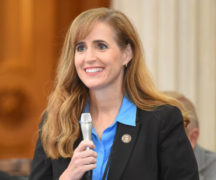BY SUSAN TEBBEN
An Ohio anti-gerrymandering ballot amendment proposal for 2024 that has been in limbo after two different rejections from the Attorney General’s Office has now been certified to go forward after its third attempt.
Attorney General Dave Yost on Monday certified the petition language for an amendment that would create an “Ohio Citizens Redistricting Commission” and amend the constitutional clauses that pertain to redistricting, confirming that the submitted summary was “a fair and truthful statement of the proposed constitutional amendment.”
The amendment proposal creates a 15-member redistricting commission including Republican, Democratic, and independent Ohio citizen commissioners, along with keeping “former politicians, political party officials and lobbyists” from sitting on the commission, according to the amendment language.
The group that created the proposal, Citizens Not Politicians, seeks to keep the commission in an “open and independent process” while creating “fair and impartial districts by making it unconstitutional to draw voting districts that discriminate against or favor any political party or individual politician.”
Five of the six versions of Statehouse district maps that were adopted by the current Ohio Redistricting Commission, which is made up of five GOP elected officials and two Democratic legislative leaders, have been ruled unconstitutionally partisan gerrymanders by the Ohio Supreme Court. The five that were rejected were under the court led by Chief Justice Maureen O’Connor, who left the court because of age limits and has now taken up the cause of future anti-gerrymandering reform with Citizens Not Politicians.
The sixth version was just adopted by the Ohio Redistricting Commission last week, representing the first time in the two years that redistricting has been conducted under the current rules that the maps received affirmative votes from the two Democrats on the commission.
It has not seen legal action, but groups who were parties in the lawsuits that led to the last five map rejections say that option is still on the table. READ MORE
Governor begins Ohio’s K-12 education overhaul despite judge extending temporary restraining order
BY MEGAN HENRY
Ohio Gov. Mike DeWine is moving forward with an overhaul of Ohio’s education department and state board of education despite a Franklin County judge extending a temporary restraining order to prevent that from happening.
After an all-day preliminary injunction hearing on Monday, Franklin County Magistrate Jennifer Hunt ruled that the temporary restraining order blocking lawmakers’ attempts to overhaul Ohio’s K-12 education system remains in effect until the court makes a decision on the case, which must happen by Wednesday at noon.
“There is certainly a potential for chaos,” DeWine said during what he called a “very unusual press conference” Monday night. “Questions such as who will send out the checks that go to our public schools across the state of Ohio, who will make the determination about eligibility for school choice. I can not let this situation fester.”
Even though the temporary restraining order is still in effect, the education department changes are still going forward because Tuesday marks 90 days since DeWine signed the state’s operating budget into law which included these changes, DeWine said.
As of Tuesday, he said, the Ohio Department of Education ceases to exist and is now the Ohio Department of Education and Workforce, as set forth in the budget DeWine signed into law in July. Interim Superintendent Chris Woolard is in charge of the department.
But it’s more than just a name change. This creates a cabinet-level director position, puts the department under the governor’s office, and limits the State Board of Education’s power to teacher disciplinary and licensure cases and territory disputes.
“We believe, based upon what our lawyers tell us, that the new department can in fact function,” DeWine said.
He said they will follow the court order and not name the new cabinet-level director, even though “we were actively in the process of finding” candidates before the temporary restraining order was put in place.
“We will not take an active part in any way as governor in the creation of the Department of Education and Workforce,” DeWine said. “The new department has money going into that department by reason of the budget that was passed by the General Assembly.” READ MORE





